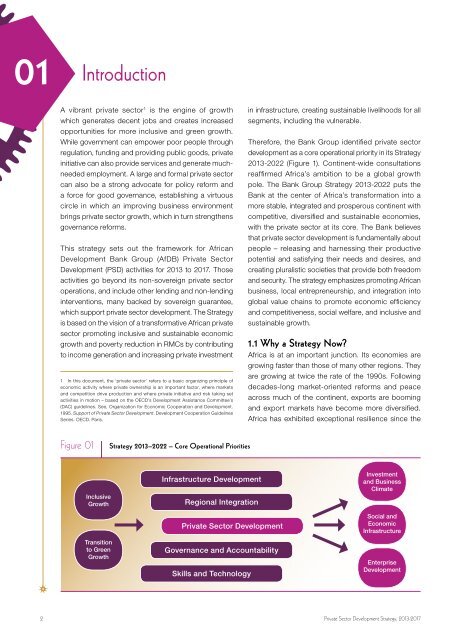2013-2017_-_Private_Sector_Development_Strategy
2013-2017_-_Private_Sector_Development_Strategy
2013-2017_-_Private_Sector_Development_Strategy
You also want an ePaper? Increase the reach of your titles
YUMPU automatically turns print PDFs into web optimized ePapers that Google loves.
01<br />
Introduction<br />
A vibrant private sector 1 is the engine of growth<br />
which generates decent jobs and creates increased<br />
opportunities for more inclusive and green growth.<br />
While government can empower poor people through<br />
regulation, funding and providing public goods, private<br />
initiative can also provide services and generate muchneeded<br />
employment. A large and formal private sector<br />
can also be a strong advocate for policy reform and<br />
a force for good governance, establishing a virtuous<br />
circle in which an improving business environment<br />
brings private sector growth, which in turn strengthens<br />
governance reforms.<br />
This strategy sets out the framework for African<br />
<strong>Development</strong> Bank Group (AfDB) <strong>Private</strong> <strong>Sector</strong><br />
<strong>Development</strong> (PSD) activities for <strong>2013</strong> to <strong>2017</strong>. Those<br />
activities go beyond its non-sovereign private sector<br />
operations, and include other lending and non-lending<br />
interventions, many backed by sovereign guarantee,<br />
which support private sector development. The <strong>Strategy</strong><br />
is based on the vision of a transformative African private<br />
sector promoting inclusive and sustainable economic<br />
growth and poverty reduction in RMCs by contributing<br />
to income generation and increasing private investment<br />
1 In this document, the ‘private sector’ refers to a basic organizing principle of<br />
economic activity where private ownership is an important factor, where markets<br />
and competition drive production and where private initiative and risk taking set<br />
activities in motion – based on the OECD’s <strong>Development</strong> Assistance Committee’s<br />
(DAC) guidelines. See, Organization for Economic Cooperation and <strong>Development</strong>.<br />
1995. Support of <strong>Private</strong> <strong>Sector</strong> <strong>Development</strong>. <strong>Development</strong> Cooperation Guidelines<br />
Series. OECD. Paris.<br />
in infrastructure, creating sustainable livelihoods for all<br />
segments, including the vulnerable.<br />
Therefore, the Bank Group identified private sector<br />
development as a core operational priority in its <strong>Strategy</strong><br />
<strong>2013</strong>-2022 (Figure 1). Continent-wide consultations<br />
reaffirmed Africa’s ambition to be a global growth<br />
pole. The Bank Group <strong>Strategy</strong> <strong>2013</strong>-2022 puts the<br />
Bank at the center of Africa’s transformation into a<br />
more stable, integrated and prosperous continent with<br />
competitive, diversified and sustainable economies,<br />
with the private sector at its core. The Bank believes<br />
that private sector development is fundamentally about<br />
people – releasing and harnessing their productive<br />
potential and satisfying their needs and desires, and<br />
creating pluralistic societies that provide both freedom<br />
and security. The strategy emphasizes promoting African<br />
business, local entrepreneurship, and integration into<br />
global value chains to promote economic efficiency<br />
and competitiveness, social welfare, and inclusive and<br />
sustainable growth.<br />
1.1 Why a <strong>Strategy</strong> Now<br />
Africa is at an important junction. Its economies are<br />
growing faster than those of many other regions. They<br />
are growing at twice the rate of the 1990s. Following<br />
decades-long market-oriented reforms and peace<br />
across much of the continent, exports are booming<br />
and export markets have become more diversified.<br />
Africa has exhibited exceptional resilience since the<br />
Figure 01<br />
<strong>Strategy</strong> <strong>2013</strong>–2022 – Core Operational Priorities<br />
Inclusive<br />
Growth<br />
Transition<br />
to Green<br />
Growth<br />
Infrastructure <strong>Development</strong><br />
Regional Integration<br />
<strong>Private</strong> <strong>Sector</strong> <strong>Development</strong><br />
Governance and Accountability<br />
Skills and Technology<br />
Investment<br />
and Business<br />
Climate<br />
Social and<br />
Economic<br />
Infrastructure<br />
Enterprise<br />
<strong>Development</strong><br />
2 <strong>Private</strong> <strong>Sector</strong> <strong>Development</strong> <strong>Strategy</strong>, <strong>2013</strong>-<strong>2017</strong>


